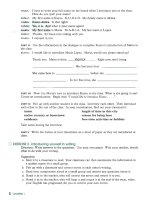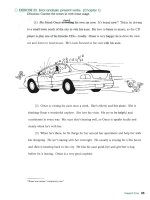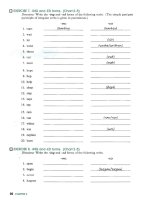Fundamentals of english grammar third edition part 48 pptx
Bạn đang xem bản rút gọn của tài liệu. Xem và tải ngay bản đầy đủ của tài liệu tại đây (389.36 KB, 7 trang )
-
-
JSE
9.
Noncount abstractions. (Chart
11-
Directim:
In groups or by yourself, complete the
ouns are usually noncount. To find out
if
a
ictionary or discuss it with your teacher.)
,
,
,
a. Name four good qualities you admire in a person.
,
.~,
1.
pahewe
3.
2.
4.
b. Name bad qualities people can have.
c. What are some of the most important things in life?
,
.'y?
a
1.
9666
ba1i-h
3.
d.
Certain bad conditions exist in the world. What are they?
1.
hw?ev
3.
il
,,
ia, ,:
t.
EXERCISE
10.
Count and noncount nouns. (Charts
11-1
+
1
1-4'1
Erections:
Choose one of the given topics. Make a written list of the things you see.
,,.<.
Example:
You're sitting
in
your office. List the
things
you see.
.
.
Written:
two wirrdows
,
,,,
.
,
.',
,I;:~,~,:,;
;
,.
,,
three desk lawps
a
lot
OF
books-avouhd
50
books abokt Ey$ish grawnv
&tce cquipw~t-n ~acirrtosk cowphte,
a
pripriev,
a
phobcopy
wnchirre
typical oNke shpplies-n stapler, paper clips, pew, perrcils,
a
vulev
,:,
,
'
sow
photogvaphs
I,
:I,,I,.
.
.,!
:
"
etc.
1.
Sit in any room of your choosing. List the things you see (including thiigs other
people are wearing if you wish).
2.
Look out a window. List the things and people you see.
3.
Go to a place outdoors (a park, a zoo, a city street) and list what you see.
4.
Travel in your imagination to a room you lived in when you were a child. List
everything you can remember about that room.
CountINoncount Nouns and
Articles
31
7
11-5
USING
SEVERAL, A LOT OF, MANYIMUCH,
AND
A
FE
WlA
LITTLE
I
I
COUNT
I
NONCOUNT
I
I
0
I
Several
is used only
with
count
nouns.
I
EXERCISE
11.
SEVERAL,
A
LOT
OF,
and MANYJMUCH. (Charts 11-1
+
1
1-5)
Directions:
Correct the mistakes.
Some sentences contain no errors. One sentence
contains a spelling error.
@)
a lot
of
chairs
(c)
many
chairs
(d)
a
feu,
chairs
SOW
1.
Jack bought
+eved
furniture.
2.
He bought several chairs.
Ok
(no
change)
a lot of
furniture
much
furniture
a little
furniture
3.
Ted bought a lot of chairs.
4.
Sue bought a lot of furniture, too.
A
lot
of
is used
with
both
count
and
noncounr
nouns.
Many
is used
with
count
nouns.
Much
is used
with
noncount
nouns.
A
fi
is used
with
count
nouns.
A
little
is used
with
noncount
nouns.
5.
Alice bought too much furniture.
6.
She bought too much chairs.
7.
Dr. Lee bought a few furniture for his new office.
8.
He bought a few chairs.
9.
He has several new furnitures in his office.
10.
He has several new chairs in his office.
11.
There is dot of desk in this room.
12.
There are a lot of furnitures in Dr. Lee's office.
EXERCISE
12. HOW MANY and HOW MUCH. (Charts 11-1
+
11-5)
Direczions:
Create questions
with
how
many
or
how
much.
Use the information
in
parentheses to form Speaker A's question.
1.
A: How
wmy
childveh
do
the ~illevs
have
?
B:
Three. (The Miers have three children.)
2.
A:
How
w~ch
MOWY
does .lake wake
?
B: A
lot. (Jake makes a lot of money.)
3.
A:
How on a soccer team?
B:
Eleven. (There are eleven players on a soccer team.)
4.
A:
How
l',',~,!,,
'
to do tonight?
B:
Just a little. (I have just a little homework to do tonight.)
5.
A:
How in the baskets?
B:
A lot. (There are a lot of apples
in
the baskets.)
6.
A:
How
in
the baskets?
B:
A lot. (There is a lot of fruit
in
the baskets.)
7.
A:
How in Canada?
B:
Ten. (There are ten provinces in Canada.)
,ti!
::
.
.
52:
8.
A:
How
before you moved to Japan?
B:
Just a little.
(I
knew just a little Japanese before I moved to Japan.)
9.
A:
How
in
the world?
B:
Approximately
22,000.
(There are approximately
22,000
kinds of fish in the
world.)
10.
A:
How
?
B: A
lot. (You should buy a lot of cheese.) It looks really good.
11.
A:
How every day?
B:
Two cups.
(I
drink
two cups of coffee every day.)
12.
A:
How
in the chalk tray?
B:
Several pieces. (There are several pieces of chalk in the chalk tray.)
CountlNoncount Nouns and Artlcles
319
EXERCISE 13.
MANY
vs.
MUCH. (Charts 11-1
+
11-5)
Directions:
Work in pairs.
Speaker
A:
Using the cues, ask a question using
how much
or
how many.
You are
looking for the answer to
"x."
Your book is open.
Speaker
B:
Listen carefully for the correct use of
much
and
many.
Answer the question.
If
you don't know the answer, guess. Sometimes Speaker
A
is given the
correct answer and can tell you how close you are to the correct answer. Your
book is closed.
Example:
water:
You drink
x
every day.
SP-R
A
(book open):
How much water do you drink every day?
SPEAKER
B
(book closed):
I
try to drink at least six glasses of water every day.
Example:
page:
There are
x
in this chapter.
(Answer: 32)
SPEAKER
A
(book open):
How many pages are there in this chapter?
SPEAKER
B
(book closed):
I
don't know. I'd guess there are about thirty.
SPEAKER
A
(book open):
Very close! There are
32
pages in this chapter.
1.
tea:
2. word:
3.
money:
4.
bone:
5.
tooth:
6.
mail:
Switch roles.
7.
sugar:
8.
language:
9.
English:
10. people:
1
1.
human being:
12. butterfly:
You usually drink
x
every day.
There are
x
in
the title of this book.
(Answer
4)
A
pencil costs
x.
There are
x
in the human body.
(Answer
206)
The average person has
x.
(Answec 32)
You got
x
yesterday.
You put
x
in your tea.
You can speak
x.
Had you studied
x
before you started attending this class?
There were
x
on earth
2,000
years ago.
(Answer: around
250
million)
There are
x
in
the world today.
(Answer: around six billion)
You can see
x
in one hour on a summer day in a flower garden.
EXERCISE 14.
A
FEW
vs.
A
LIlTLE. (Charts 11-1
+
11-5)
Directions:
Complete the sentences by using
a few
or
a
little
and the given noun. Use the
plural form of the noun when necessary.
REMINDER:
Use
a
few
with a count noun:
afew songs.
Use
a little
with a noncount noun:
a little music.
1.
music
I
feel like listening to
a
little
mwic
tonight.
2.
song
We sang
ol
few
s
6
h9s
at the party.
3.
help
Do you need with that?
4.
pepper
My grandfather doesn't use extra salt, but he always puts
on his hard-boiled egg
5.
thing
I
need to pick up
at the market on my
way home from work tonight.
6.
apple
7.
fruit
8.
advice
9.
monq
10.
coin
1
1.
friend
12.
rain
13.
Fwnch
14.
hour
,
15.
worhpaste
_.
16.
chicken
I
bought
-
at the market.*
.
-
.
,'.
I bought
I
*
,
.:
;.,,
at the market.
.
.,.*
I need
If
I
accept that job, I'll make
more
Annie put
in
her pocket.
came by last night to visit us.
It looks
like
we might get
today.
I think I'll take my umbrella with me.
I can speak
,
but I don't know
any Italian at all.
Ron's plane will arrive in more
Tommy, put just on your
toothbrush, not half the tube!
I'm still hungry. I
think
I'll have more
When
I was a child, we raised
in
our backyard.
a
little
chicken
I
a
little
chlcken
I
a
few
chickens
I
a
blq
chicken
I
a
lot
of
chicken
I
a
lot
of
chickens
'I
bought
a
fm
apples.
=
I
bought a small
number
of apples.
I
bought
a
lid*
apple.
=
I
bought one apple,
and
it
wes
small,
not
large.
CountlNoncount Nouns and
Artlcles
321
1
11
-6
NOUNS
THAT
CAN
BE
COUNT OR NONCOUNT
ylure
a
xew
nouns can oe useu as eirner counr or noncounr nouns. oxamplev
ur
UUUI
uuunr
mu
nuncounr
usages for some common nouns follow.
NOUN
USED
AS
A
NONWW
NOUN
USED
AS
A
COUNT
NOUN
ghs
(a) Windows
are
made
of
glass.
(b)
I
drank
a glass
of water.
(c) Janet wears
glasses
when she reads.
hair
(d) Rita has brown
hair.
(e)
There's
a hair
on my jacket.
(m) How
much
tim
do you need to
finish
(n) How
many
times
have you been
in
Mexico?
I
iron
light
paw
I
work
1
(0)
I
have
some
wonk to do tonieht.
I
(D)
That ~aintine is
a
wonk of
art.
I
chicken1
(s)
I
ate
some
chickdamnefish.
1
(t) She drew a picture of
a ch*hn/a&h.
fib
1
I
(f)
Iron
is a metal.
(h)
I
opened the curtain to let in
some
&ht.
(j)
I
need
some
paper
to write
a
letter.
ex@-
(u)
I
haven't had
much ex@enhce
(v)
I
had
many
interesting
expwknces
on my
I I
with
mmpum
(l
don't have mud
I
trip. (Many interesting events happened to
(g)
I
pressed my shirt
with
an iron.
(i) Please
nun
off
the lights
(lamps).
(k)
I
wrote
a papev
for Professor Lee.
(l)
I
bought
a
paj~er
(a newspaper).
I
~
-
I
knowledge or skill
in
using computers.)
(
me on my trip.)
I
EXERCISE
15.
Nouns that can
be
count
or
noncount. (Chart
11-6)
Directions:
Complete the sentences with the given words. Choose words
in
parentheses as
necessary.
1.
chicken
Joe, would you like
(a,
some)
sowe chickeh
for dinner tonight?
2.
chieken
My grandmother raises
ckicbe~s
in
her yard.
3.
time
It took a lot of
to write
my
composition.
4.
I
really like that movie.
I
saw it three
5.
paper
Students
in
Prof. Young's literature class have to write
a
lot of
.
,
6.
paper
Students who take thorough lecture notes use
a
lot of
322
CHAPTER
11
7.
paper
The
New
York
Times
is
(a, some)
famous
-
iwi
.
8
*L:~
.
,,
.~-
,
c.
>Yk,
'.
;*,:
*k&.&&'.?
.;,,
:!~:
.
. .
,
'
8.
work
Rodin's statue of "The Thiiker" is one of my favorite
of art.
I have a lot of
to do tomorrow at my
office.
9.
work
10.
light
11.
light
12.
hair
13.
hair
14.
glass
15.
glass
16.
glass
17.
iron
If
accidentally
(get, gets)
in a darkroom,
(I&
they)
can
ruin photographic negatives.
There
(is,
are)
a lot of fluorescent
on the ceilings of
the school building.
Erin has straight
,
and
Sara
has curly
Brian has a white cat. When I stood up from Brian's sofa, my black slacks
were covered with short white
I wear because I'm nearsighted.
In
some countries, people use
for their tea; in other
countries, they use cups.
Framed paintings are usually covered with
to protect
them.
(is,
are)
necessary to animal and plant life.
18.
iron
(is, are)
used to make clothes look neat.
19.
experience
Grandfather had a lot of interesting in his
long career as a diplomat.
20.
experience
You should apply for the job at the electronics company only if you have a
lot of in that field.
CountlNoncount Nouns and
Articles
323









